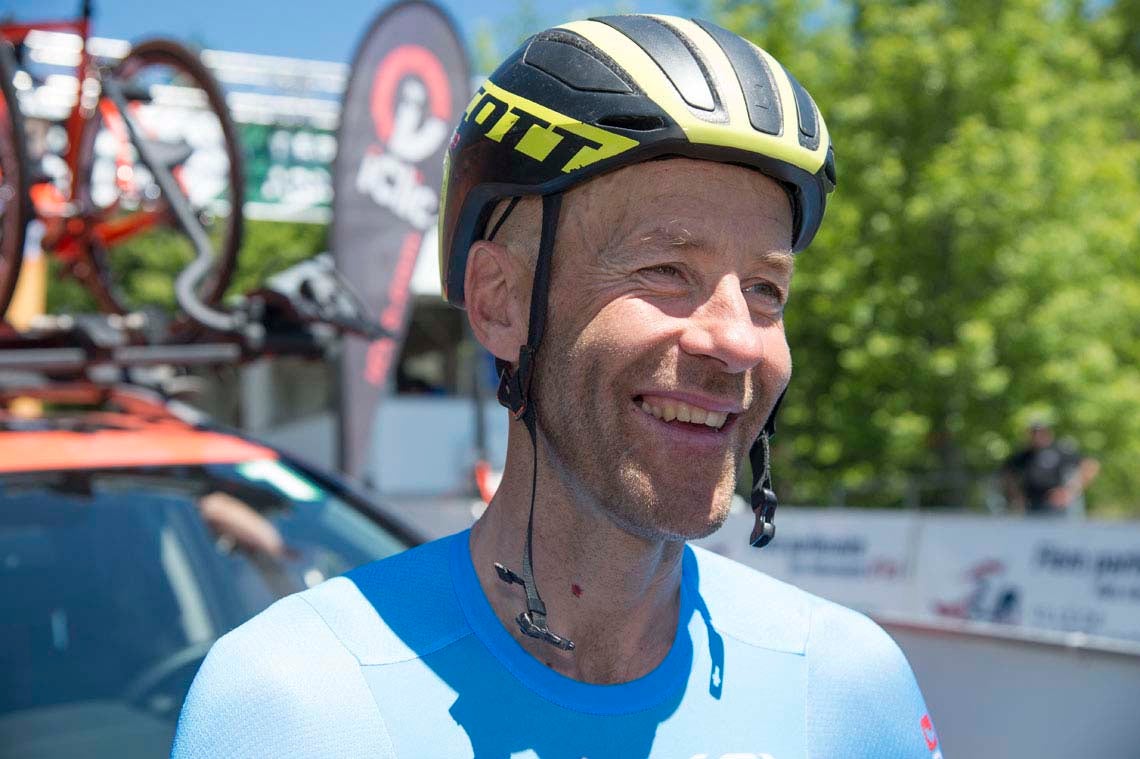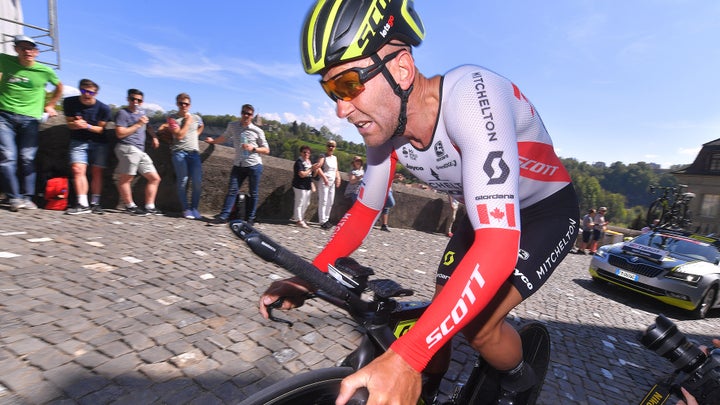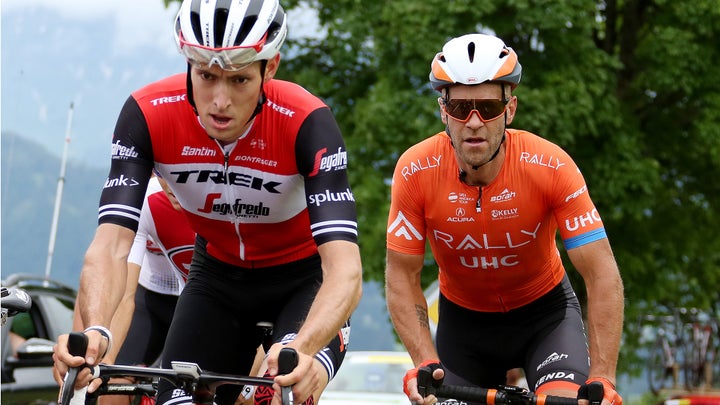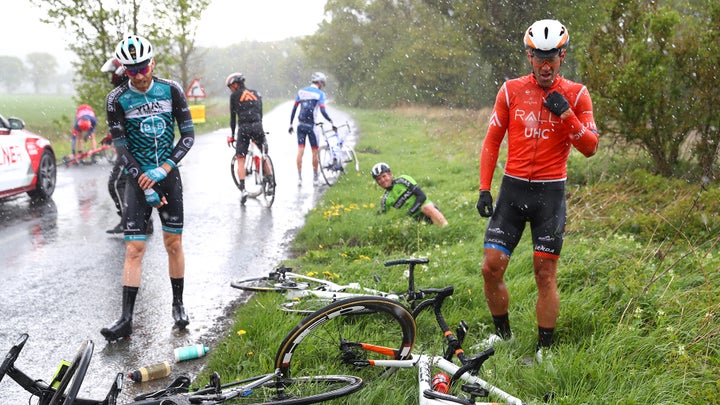Svein Tuft and the Zen of Retirement

Svein Tuft at the 2019 Tour de Beauce . Photo: Casey B. Gibson
Svein Tuft wasn’t going to be idle for long in retirement. He also knew he wasn’t going to open a café or sell real estate. When the 42-year-old Canadian hung up the cleats last year to cap a 17-year career, he had a hunch bikes would remain part of the story.
Cycling has always been a central part of his personal journey long before he started racing bikes for a living. Tuft’s legendary long-haul bike treks across Alaska and the Canadian Rockies more than 20 years ago helped forge his toughness, and would set him on a path to race in the WorldTour for more than a decade.
So when his racing career was winding down in 2019, it’s no surprise that bikes and cycling will remain fundamental to his character. He just didn’t know what he wanted to do.
Initially, his retirement plan was to take a year off, spend some time with family back in Canada, do some traveling, and ease into life as an ex-pro. That didn’t last long.

“After about two weeks I couldn’t handle not doing anything,” he said. “I knew I couldn’t just sit on a beach.”
Tuft also knew what he didn’t want to do, and at the top of that list was not to become a sports director at a WorldTour team. He didn’t want to trade 100 days on the road as a racer for the same itinerate lifestyle as a sport director. His days of chasing bike races are over.
The pieces slowly came together. Andorra had become home, and since his passion for riding and exploring remain as strong as ever, Tuft soon began developing ideas of guiding off-road and gravel tours on the roads he’s been training on and exploring for nearly a decade. Then the idea of a bike shop catering to the burgeoning gravel and backcountry scene also took root. And before he knew it, Tuft was drawing up blueprints, signing documents and putting on his entrepreneur’s cap.
(visit Tuft’s bike shop website).
“I’m working harder now than I ever did as a bike racer,” he said in a telephone interview. “When you stop racing bikes you realize what a useless human you’ve become. When you are racing bikes, you aren’t doing anything useful.”
Tuft and his wife, also Canadian, and his two-year-old son Gunner, spent much of the winter back home. Initially, the couple considered moving back to Canada, but the tug of Europe remained strong. Tuft has called Andorra home since 2012, and as they mulled their options, staying put high in the Pyrénées without the pressure to train and race seemed like a pretty good option.
“We are happy in Andorra, so we decided to stay here a bit longer,” he said. “Maybe forever — who knows?”
Now, Tuft has plenty to keep him busy. Instead of riding his bike 40 hours a week, he’s pouring that energy into opening a bike shop in time for the summer riding season. He’s also designing a series of bike tours on the network of high gravel roads that lace the Pyrénées across Andorra, France and Spain.
“I’m juggling so many things,” he told VeloNews. “I’m starting a bike shop, starting a bike touring company. There’s a lot of bureaucratic stuff, logistics, planning, getting orders ready. It’s exciting. I’ve never answered so many e-mails in my life.”
Being busy is just fine for Tuft. After retiring at the Canadian WorldTour races in a final season with Rally-UHC, Tuft knew his racing days were over. For some pros, the transition to retirement can be filled with emotional and financial landmines.
Tuft wants his new lifestyle and business ventures to reflect the same holistic and balanced approach he’s always brought to his racing career. For him, racing and winning wasn’t everything, and now that he’s donning the hat of a small business owner, he’s not going to go overboard. He plans on hanging out the “gone skiing” sign on the door when the time is right.
Tuft’s shop will be in Santa Coloma, on the main valley road leading into the heart of Andorra. He imagines a space where riders can pick up rentals, gear and equipment as well as hang out to talk routes and adventures before and after riding. There are also plans to open vacation rentals above the shop.
“We can do tours right out of the shop, and then come back and be in a nice communal space,” he said. “It’s nice to have a place to go to every day.”
Another key component will be adventure tours that he’ll be running with support staff in and around Andorra. Two spring trips are already planned at lower elevation in Catalunya’s Garrotxa mountains that will be clear of snow in March and April. After that, he’ll move to higher terrain in the Pyrénées across Andorra, Spain and France.
“I know this area like the back of my hand,” he said. “There’s everything. A lot of it is in parkland, so there’s no development at all. There’s some immaculate gravel roads, some big, crazy climbs, and lots of switchbacks. I’m still fascinated by all this terrain.”
Andorra has been Tuft’s home since 2012, when he moved up to the mountain enclave after finding the cycling hub in nearby Girona too busy for his liking. Andorra sometimes gets a bad rap for its over-built touristy central valley, but the principality is loaded with high peaks and deep forests that made Tuft feel right at home. And Tuft knows almost every nook and cranny, exploring the area by foot (he hikes without boots), backcountry touring in the winter, and on gravel or mountain bikes all summer.
Gravel will be a natural focus for Tuft. His shop and bike tours will be centered on the endless miles of gravel and single-track that trace endlessly across the Pyrénées.

Even when he was still a pro, he had already started spending more and more time on the gravel roads that loop around Andorra and the high Pyrénées that straddle the French and Spanish borders. He fitted out a hard-tail mountain bike with different wheels long before the gravel trend caught on.
“I know gravel has become trendy, but if you love cycling, it’s the best way to explore,” he said. “It just makes sense today with so much traffic on the roads. The biggest selling point of gravel is you don’t have to be on the roads, and you’re out in nature.”
And, yes, they’ll be some racing, too. Though he’s still hammering out the details, Tuft said he will be jumping into the burgeoning gravel racing scene and will participate in some of the bigger events later this summer.
“I’ll do some gravel races,” he said. “It’s more to be part of the experience. I know it’s hard any time you sign up for a race, and I will go out there and give her a rip. Already for a bunch of years I’ve almost only been training on gravel. That’s my passion, and one of the reasons I ride bikes is to go out and explore.”
Tuft won’t be completely disconnected from professional road racing. Though he doesn’t want to take on a traditional role as a sport director, he hopes he can stay involved in the sport to act as a mentor and sounding board for younger riders. Tuft imagines a new kind of a role as a facilitator or communication bridge between riders and team management.
“I’d like to help young riders make that transition to the World Tour, and help them get settled in, and not just trade everything for a few good results and blow out their bodies in five years,” Tuft said. “I think the sport needs to be looking at the bigger picture and invest in riders.
“I see the stress from year-to-year, and guys are so pinned to have a contract for the next season,” he continued. “There is a lot of desperation out there, and we need to change that.”
Tuft has always nurtured a spiritual side, he’s brought a kind of transcendent warrior ethos to his racing. He’s long studied martial arts, yoga, and meditation, and incorporated much of those teachings and philosophy into his racing career. On any given morning, hours before the start of a race, Tuft would be spotted by teammates walking barefoot into a nearby forest to catch a few moments of quiet solitude for a meditation session before dipping back into the WorldTour bubble.
Tuft often saw his friends and rivals suffer in a system that he says does not take enough care of its central actors.
“Professional cycling is a bit of a mercenary lifestyle, and that needs to change,” he said. “Some rough decisions get made and people are left on sidelines. Some high prices are paid because of some miscommunication.”
Tuft has already begun quietly working with his former team at Mitchelton-Scott as an informal advisor. There’s nothing official or designated, Tuft joined the team at a recent training camp in Sicily. He hopes to stay in touch with riders to serve as a confidante or advisor for matters both inside and out of the peloton.
“I like working with people, and a lot of riders get bad advice from agents,” Tuft said. “Too often the focus is on how to get more money, on how to get on this team or that team, when it should be about what that person needs to be happiest in their career and to make it last a long time. Agents are always about pushing for more money, a lot of times it can do damage. It’s the wild west out there.”
As Tuft steps back from the WorldTour, he can reflect on a highly successful career. He won 11 Canadian national time trial titles, wore the pink jersey at the Giro d’Italia, and won more than 20 professional races. He raced on his terms, and he left on his terms as well.

Does Tuft miss the thrill of racing?
“Not at all,” he said. “I rode with the Mitchelton-Scott crew in Sicily, and they were all soon off to the races. I was like, thank God I don’t have to go anymore. I know how hard that is. The level is so high now. I just don’t have that in me anymore.”
What he now has is a lot more time. And Tuft is going to get back to what he loves doing most, and that’s exploring the world from two wheels.
Some ex-pros have a hard time transitioning to civilian life. You get the feeling that Tuft is going to be just fine.